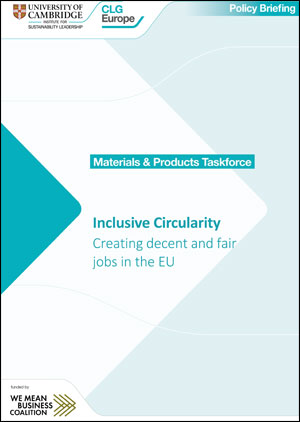5 December 2023 - CLG Europe’s Materials & Products Taskforce has released a new report on the importance of the connection between the transition to a circular economy and the creation of decent and inclusive jobs for all.
Download the policy briefing.
This policy briefing provides an overview of the types of jobs that are needed in a circular economy, the opportunities and barriers around creating decent and inclusive jobs, the links between circular economy and social policies, and the private sector’s views on this topic.
The policy briefing aims to:
- Improve the knowledge of businesses and policymakers about the relevance of the transition to a circular economy. This includes the opportunity to create new jobs for Europeans, and how to distribute the impacts and the social implications of this transition.
- Set out what policies are required to make a more comprehensive, coherent and clear approach work into practice. This is to address the social aspects of a circular economy, in particular in the creation of decent jobs and ensuring inclusive employment both in the EU and globally.
The briefing is based on an extensive literature review and it features several inputs provided by companies and Members of the Materials & Products Taskforce.
The report provides several recommendations for policymakers to assess and design circular economy policies to ensure an equitable and inclusive transition:
- Assess the distributional impacts of an increased share of circular economy policies on the employment of all workers, including vulnerable workers, with gender disaggregated data.
- Identify the characteristics of a socially just circular economy and integrate these considerations into the monitoring of the impact of a circular economy, including employment.
- Secure adequate financing of the transition towards a socially just circular economy.
- Enhance synergies between business and government to ensure that circular policies contain strong social safeguards.
- Strengthen the coherence between social and circular economy policies.
- Ensure that the transition to a circular economy is globally fair and just.
- Agree a shared definition of circular jobs that takes into account core, enabling and indirect circular jobs across the formal, informal and social economies.
Learn more about the Materials & Products Taskforce’s work here.
Citing this report
University of Cambridge Institute for Sustainability Leadership (CISL). (2023). Inclusive Circularity: Creating decent and fair jobs in the EU. Cambridge, UK: CLG Europe.





